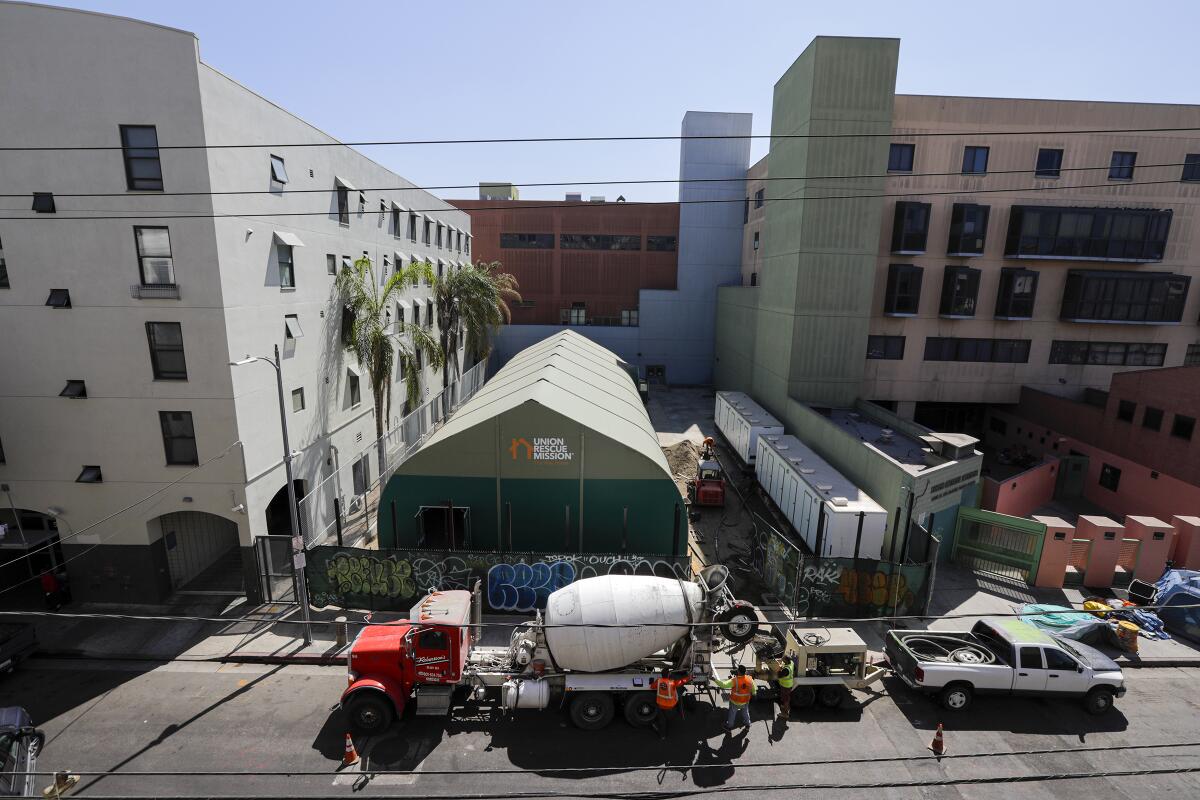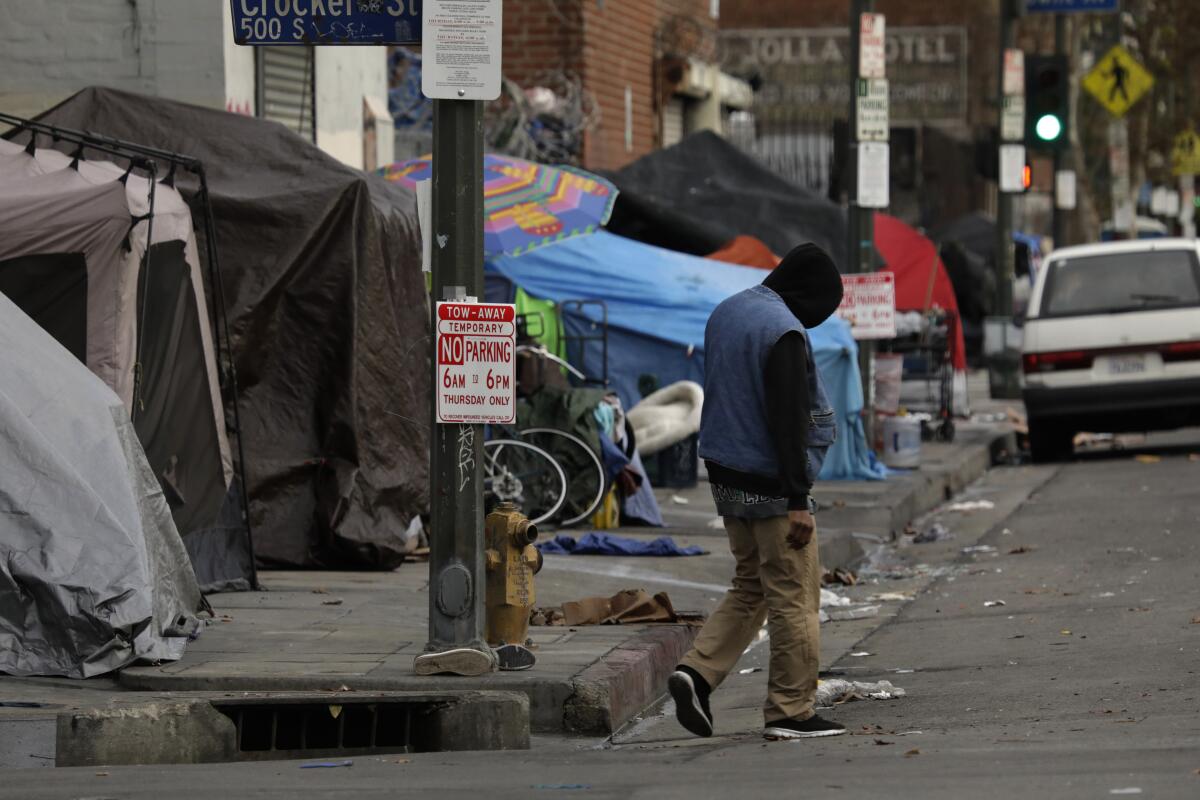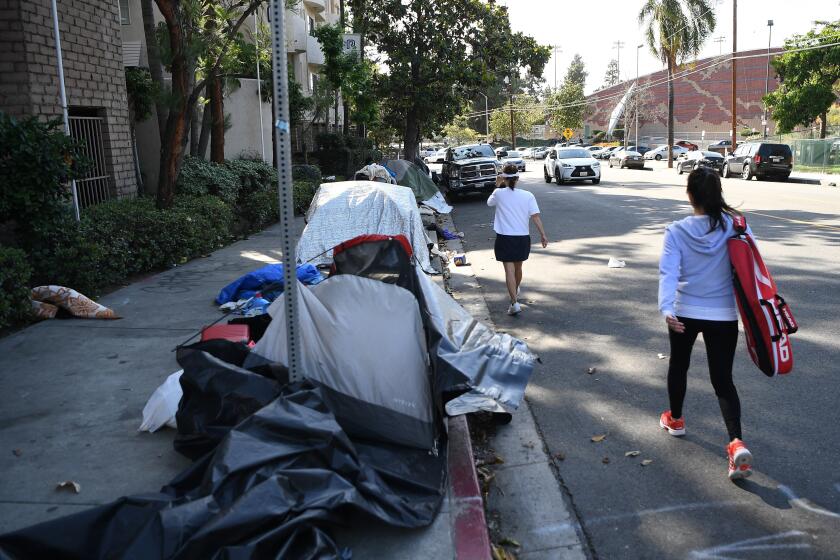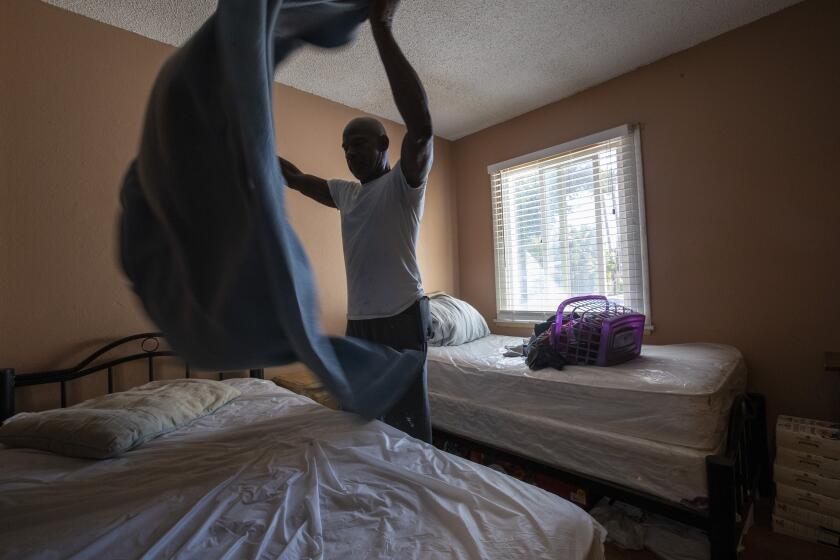Trump has limited options to combat homelessness in Los Angeles

- Share via
WASHINGTON — Although the White House has vowed to take action to combat homelessness in Los Angeles and other cities, President Trump’s options are limited without cooperation from the courts, Congress and local and state governments.
Administration officials have floated a range of potential plans — including using police to clear skid row and other encampments, reducing regulations for building new housing, and increasing temporary shelter space by making federal facilities available or erecting temporary structures.
Advocates and officials in California say they would welcome a truly cooperative effort with Washington.
But some warn that Trump, who has attacked liberal cities and often pitted himself against California in particular, may try either to push legal limits to punish homeless people or to take more symbolic action that would further stigmatize the population.
“The federal government has enormous power, obviously, and you always want to believe that there might be the opportunity for a real partnership on a life and death set of issues,” said Darrell Steinberg, the Democratic mayor of Sacramento who is the co-leader of a state homeless task force. “But you can’t help but be cynical when it involves this president and his consistent pattern of behavior.”
L.A. County officials have rebuffed Mayor Eric Garcetti’s request for Measure H funds to open and operate an additional 800 beds at homeless shelters.
White House spokesman Judd Deere blamed “over regulation, excessive taxation, and poor public service delivery” for a dramatic increase in homelessness, with attendant public health risks, in recent years. The homeless population in Los Angeles County rose by 12% last year, to nearly 59,000, according to official estimates.
“Homelessness has become a crisis that cannot be ignored,” Deere said.

He said Trump, who ordered a team of advisors to visit encampments and other sites in Los Angeles in September, had asked for “a range of common-sense policy options” to solve a problem that Deere claimed some governors and mayors have ignored.
Deere would not detail the administration’s options or provide a timeline for action from Trump.
But administration officials recently asked for the resignation of the head of a federal agency that oversees the federal response to homelessness. Matthew Doherty, an Obama administration holdover, served as director of the U.S. Interagency Council on Homelessness.
He had already been sidelined, but his departure suggested Trump may be preparing to unveil his plans soon.
Trump has seized on California’s homeless crisis as part of his larger campaign to paint America’s cities as laboratories for out-of-control liberal policy, a description that plays well with his largely rural political base.
“Los Angeles, it’s a disaster,” Trump said in September while visiting a replacement fence along the border in Otay Mesa. “In the case of — if you look at San Francisco, it’s a total disaster what’s happening, where they’re going to ruin those cities.”
“We’re going to get involved very soon on a federal basis if they don’t clean up their act,” he said, complaining that Los Angeles has “tents all over the place.”
Alarmed by the closure of board and care homes, L.A. officials are gearing up to push the California Legislature and Gov. Gavin Newsom for more money.
Trump’s Council of Economic Advisors issued a report in September calling for fewer regulations on housing development. It said better conditions for sleeping on the streets and better access to shelters lead to an increase in the homeless population by catering to them.
The report also lauded using police “to help move people off the street” when such actions were “paired with effective services.”
Development regulations are largely controlled by state and local officials, though the federal government could push changes by threatening to withhold federal dollars.
California is already easing some zoning rules to spur low-income housing, including those that restrict multi-family units in some areas.
Advocates agree the housing supply needs to be increased, but say it is not the entire problem. Some worry that Trump’s proposals could weaken labor, fair housing or environmental standards.
In addition, the U.S. 9th Circuit Court of Appeals issued a ruling last year that severely restricts the ability of cities and counties in Western states to use law enforcement to clear encampments when there are no available shelters. Los Angeles is among many cities that have asked the Supreme Court to review the decision.
It’s not clear what federal officials could do to compel local jurisdictions to clear streets of homeless people, even if that decision is overturned.
But advocates who have long fought to prevent the homeless from being funneled through the criminal justice system worry about rhetoric that encourages harsher police tactics.
“It’s politicizing some of the most vulnerable people in our country, which is really shameful and atrocious,” said Diane Yentel, who heads the National Low Income Housing Coalition, an advocacy group.
The federal government could provide the most immediate impact by providing access to federal land or structures as temporary shelters.
The administration officials who came in September visited a former Federal Aviation Administration facility in Hawthorne, although the vacant office building near Los Angeles International Airport was already being sold to a commercial developer.
Nan Roman, president of the National Alliance to End Homelessness, sees providing new emergency facilities as potentially helpful, “if there was an exit strategy to go with it.”
But she said it would require plans to house people permanently and assurances that people would not be forced into them. She cautioned against using federal lands to lure homeless people to remote places where they are out of sight and unable to access services.
“If they want to do something useful, it wouldn’t be just about the optics,” Roman said.
So far, the administration has largely kept its plans within a tight circle of White House policy advisors.
At a Senate hearing for newly nominated officials at the U.S. Department of Housing and Urban Development last week, the nominees said they had not read the administration’s September report that suggested nice shelters were prompting people to remain homeless.
“I will say that most of the shelters I’ve toured have not been luxurious by any stretch of the imagination,” said Brian D. Montgomery, an assistant secretary who was nominated to become the deputy secretary.
A HUD spokesperson declined to make an official available for an interview.
Los Angeles County Supervisor Kathryn Barger said she’s heard nothing from the White House or HUD about the federal government’s plans for homelessness in California.
“If they want to be a partner, you’re welcome to be a partner, but if it’s coming in to tell us that they can do it better, I respectfully disagree,” said Barger, the only Republican on the five-member board.
She said HUD needs to increase funding for Section 8 housing, for instance. She and Mayor Eric Garcetti have called homelessness a nonpartisan issue.
“We know what works, but we can’t do it alone,” Garcetti’s spokesman, Alex Comisar, said in a statement renewing the mayor’s request for more federal dollars.
Times staff writers Dakota Smith and Ben Oreskes contributed to this report from Los Angeles.
More to Read
Get the L.A. Times Politics newsletter
Deeply reported insights into legislation, politics and policy from Sacramento, Washington and beyond. In your inbox twice per week.
You may occasionally receive promotional content from the Los Angeles Times.













